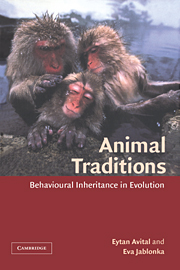Book contents
- Frontmatter
- Contents
- Preface
- Acknowledgements
- 1 New rules for old games
- 2 What is pulling the strings of behaviour?
- 3 Learning and the behavioural inheritance system
- 4 Parental care – the highroad to family traditions
- 5 Achieving harmony between mates — the learning route
- 6 Parents and offspring – too much conflict?
- 7 Alloparental care – an additional channel of information transfer
- 8 The origins and persistence of group legacies
- 9 Darwin meets Lamarck – the co-evolution of genes and learning
- 10 The free phenotype
- References
- Index of species
- Index of subjects
2 - What is pulling the strings of behaviour?
Published online by Cambridge University Press: 28 October 2009
- Frontmatter
- Contents
- Preface
- Acknowledgements
- 1 New rules for old games
- 2 What is pulling the strings of behaviour?
- 3 Learning and the behavioural inheritance system
- 4 Parental care – the highroad to family traditions
- 5 Achieving harmony between mates — the learning route
- 6 Parents and offspring – too much conflict?
- 7 Alloparental care – an additional channel of information transfer
- 8 The origins and persistence of group legacies
- 9 Darwin meets Lamarck – the co-evolution of genes and learning
- 10 The free phenotype
- References
- Index of species
- Index of subjects
Summary
Any discussion of evolution must assume something about heredity, so ideas about evolution and notions of heredity are intimately linked. From the outline of our views given in the previous chapter, it will be clear that we believe that something is wrong with the assumptions about heredity that underlie a lot of present-day evolutionary thinking. In this chapter, therefore, we are going to take a closer look at the hereditary basis of behaviour, focusing on its genetic basis. What does it mean to say that genes determine behaviour? What is the difference between this assertion and the claim that patterns of behaviour have a genetic basis? To what extent do heritable differences in behaviour reflect genetic differences?
Often the easiest and most fruitful way of thinking about the evolution of behaviour is to have some actual animal behaviour in mind, so in this and most subsequent chapters we are going to ground our discussion on some observations of real animals in their natural habitat. This time we take ourselves at sunrise to an old olive orchard in the Judaean hills near Jerusalem.
It is April, and the ground is covered by a dense multicoloured carpet of flowers. A small, black, white and yellow bird hops silently and effortlessly from branch to branch, eventually reaching the top of an olive tree. The soft light is brightening rapidly, and the first burst of song from the treetop does not leave any doubt: it is a fine resident male great tit. […]
Information
- Type
- Chapter
- Information
- Animal TraditionsBehavioural Inheritance in Evolution, pp. 34 - 62Publisher: Cambridge University PressPrint publication year: 2000
